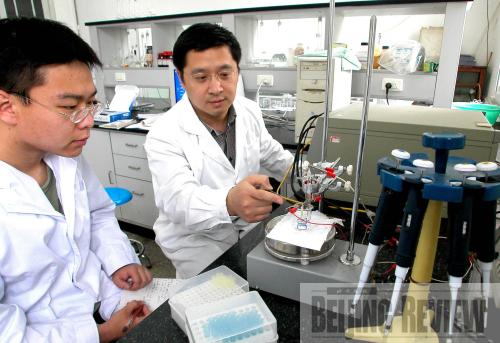|
 |
|
LEADING EDGE: Nankai University pharmacology professor Chen Qiang (right) experiments on finding ways to kill the virus that causes Severe Acute Respiratory Syndrome (SARS) back in 2003 (LIU HAIFENG) |
Nankai has experienced ups and downs together with the country. On July 29, 1937, Japanese invaders bombed the campus of Nankai. "The library and all the books in it were burned to ashes," wrote Israel Epstein, an Associated Press journalist who was an eyewitness. On July 30, Japanese troops occupied the campus and stayed there for eight years. Nankai Middle School and Nankai Primary School were both bombed to rubble as well.
In 1938, to avoid bombings by Japanese invaders, staff of Nankai and the prestigious Tsinghua and Peking universities, cooperatively formed a new institution on their way to southwest China, the National Southwest Associated University (NSAU), which was regarded as the country's best. It housed the country's leading scholars and several Nobel Prize winners. After the War of Resistance Against Japanese Aggression (1937-45) ended with victory over the Japanese, the staff of NSAU separated back into three original universities.
In 1945, Zhang organized a conference in Chongqing and advocated for China being the host of the Olympics, the first time the country took such a step.
Opening doors
On July 22, 2009, Nankai University hosted the 22nd International Young Physicists' Tournament (IYPT). It was the first time the competition, which is regarded as the physics World Cup, was held in China.
The IYPT had been unknown in China, which had not sent participants until 2008. Romano A. Rupp, head of the Applied Physics School at Nankai, introduced China to the competition. As a longtime IYPT judge, he knew that it offered exceptional training in creative thinking and working in a team to students. With his help, the China Physical Society assigned a team from Nankai University to go to South Korea in 2007 to take part in the 20th IYPT along with students from Nankai Middle School. The team scored well and also allowed China to become the host country for the 22nd IYPT.
A month after Rupp became the head of the Applied Physics School, 41-year-old German mathematician Christian Reidys, who had moved to the university in 2007, was appointed as the vice director for the Center for Combinatorics.
"It is a wonderful and ideal place for me. It is not only an academic institution, but also a big family," said Reidys, who also promotes the university abroad as head of international communication.
"These famous foreign scholars chose to come to Nankai because of the fast development of China as well as the charm of the university," said Rao. "A good university should cultivate talent while employing talent from abroad."
Nankai has endeavored to attract scholars from famous universities such as Oxford and Cambridge. At the same time, Nankai students have also been sent to these universities for further study. Every year, 100 students are sent abroad for doctoral studies to one day come back and become Nankai professors.
Exchanges with Chinese universities is much more frequent. Every day, two shuttle buses run between Nankai, Peking and Tsinghua universities.
In 1919, the university's inaugural year, 30 out of 40 teachers were graduates of renowned universities abroad. The same year, Yan set up a scholarship to sponsor students to go abroad for further study.
And that mission continues. He Liang, a student majoring in computer science and technology, received an invitation this year to attend an academic conference in Canada that he could not afford. The university paid the bill for him.
Starting this year, Nankai University will allocate no less than 500,000 yuan ($73,180) every year to sponsor doctoral students to go abroad for academic conferences. The funds will be used to pay roundtrip airfare and accommodations.
In recent years, the university has also set aside several million yuan a year to fund creative studies for undergraduates. "The money can be used by all majors, including science and technology, literature and culture. Thousands of students apply for it every year," said Xue Jinwen, Party Secretary of Nankai University. | 